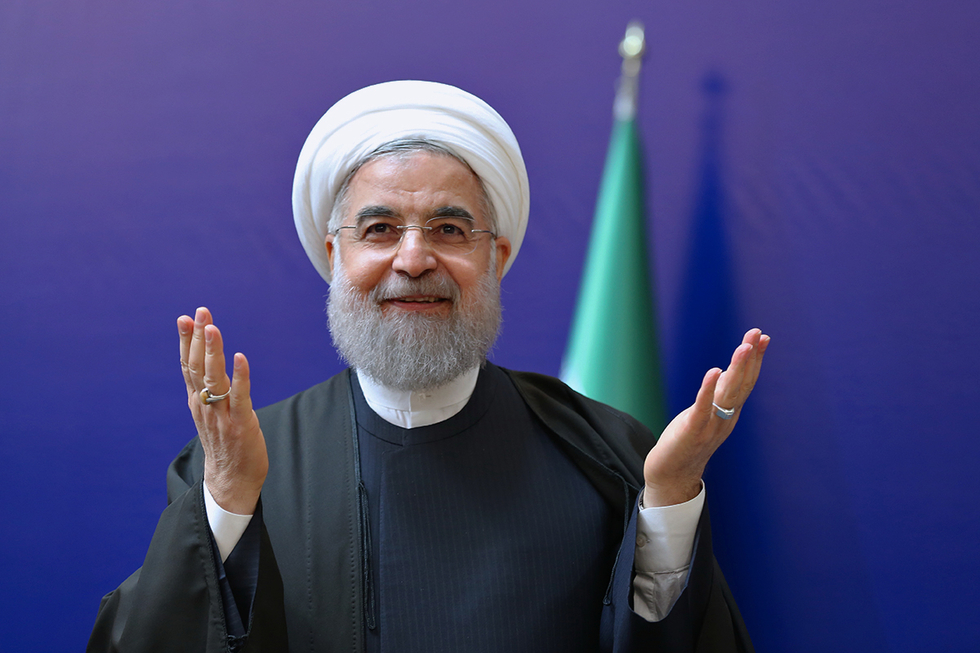London – Head of the Iranian reform policies committee Mohammed Reza Aref revealed deep divisions between the reformists and President Hassan Rouhani over the formation of the country’s new government.
The revelation was made weeks before the president is set to be officially sworn in to office after being elected for a second term earlier this year.
Intense efforts are being made to form a new cabinet. Aref has meanwhile demanded from Speaker Ali Larjani to urge Rouhani to “be open with the people over the country’s financial situation.”
He stressed that selling oil and gas does not comply with the Iranian budget.
Commander of the Iranian Revolutionary Guards Mohammed Ali Jaafari also refused to stop his forces’ economic activity, saying that he cannot “stand idly by to the needs of the revolution and people.”
Aref directed a strongly worded rebuke to his “moderate” reformist ally Rouhani, saying that he “condemns the reformists for winning a second term in office” and demanding that consultations be made with the higher reform policies committee to form a new government.
He denied that his reform bloc was seeking a share of the government from Rouhani, adding however: “There is no doubt that his victory condemns the reformists. We want him to coordinate with the ‘Amal’ reform bloc to form a cabinet.”
“Some win victories, but forget those who toiled for him,” he said in an indirect reference to the reformists’ dispute with Rouhani.
The pro-Rouhani political “Intikhab” website noted that Aref’s change in stance towards the president came two days after meeting with him to discuss the formation of the new government.
It described Aref’s tone as “going against norms and ethics,” denying that the higher reform policies committee represents all reform forces.
“The committee is at the core of disputes among reformists,” added the website.
This is the first time that disputes between Rouhani and his reform allies are aired out in the open to such a degree, which indicates the reformists’ “quiet” return to political life after the 2009 elections. Aref said that his movement succeeded in regaining the trust of the public in wake of the 2013 polls. Aref had withdrawn from the presidential race that year in Rouhani’s favor.
Moreover, he defended the reformists’ rhetoric, adding that there are no disputes between them and Supreme Leader Ali Khamenei.
Cracks between Rouhani and his reform allies started to appear before the parliament speaker elections that were held last months and two weeks after the announcement of the presidential elections results.
The Amal bloc had at the time accused pro-Rouhani ministers of orchestrating a campaign at parliament aimed at ousting deputy Speaker Ali Motahari.
The bloc even threatened to end its government alliance with Rouhani if the president’s ministers attempted to create confusion among the reform current at the parliament presidential authority.
In addition, Aref defended on Thursday the 2005 formation of the higher reform policies committee, denying the existence of any dispute between him and former President Mohammed Khatami.
The committee is trying to work on achieving reform away from partisan and individual interests, he stressed.
His statements were made in wake of demands made by a number of reform figures over the appointment of ministers who adhere to Rouhani’s slogans on economic and political reform and improving public freedoms in Iran. These slogans gave the president an edge against conservative candidates in the elections.
Reform MP Gholam-Ali Jafarzadeh rejected the criticism against Rouhani, saying Aref’s remarks on the reformists’ influence on the results of the May presidential elections “harm the elected president.”
MP Ayman Abadi criticized how Rouhani’s role in the elections was being ignored, warning reformists against “thinking of obtaining a share in government.”
Meanwhile, Jaafari rejected on Thursday Rouhani’s criticism of the Iranian Revolutionary Guards role in Iran’s economy.
He said: “The Guards cannot ignore the needs of the revolution and the people.”
“We are prepared to carry out revolutionary work to help the people in order to give a chance to the private sector,” he added.
Earlier this year, Rouhani had stoked the anger of the Revolutionary Guards when he described its military wing as a “rifle-wielding government.”
